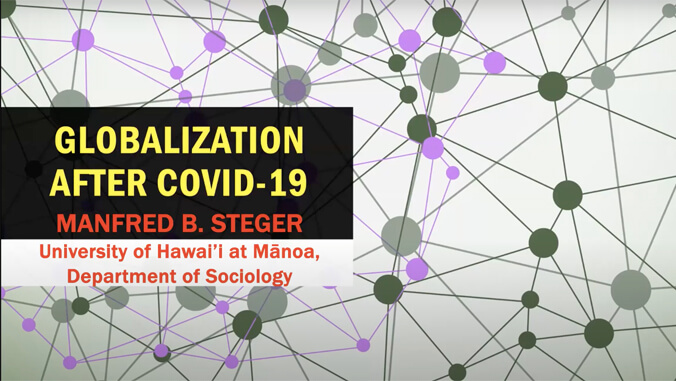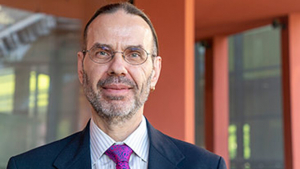
The COVID-19 pandemic is the latest in a series of multiple social crises that have impacted the global flow of people, things, institutions, and ideas in the opening decades of the 21st century. Many view pandemic lockdowns and social distancing as forms of “deglobalization” measured by the reduction of the objective movements of goods and people. A few discerning academic observers, however, instead think of it as “reglobalization” spearheaded by growing forms of digital interconnectivity.
These conflicting perspectives on globalization and global social change were shared by Professor Manfred Steger from the Department of Sociology in University of Hawaiʻi at Mānoa’s College of Social Sciences. His November 15 talk, “Globalization after COVID-19,” was the featured lecture of the Mānoa International Education Week.
Crises create “The Great Unsettling”

Steger said that other major crises in the early 21st century include anti-trade protests from 1999–2001, post-9/11 global terrorism, the 2008 Global Financial Crisis followed by the Eurozone Crisis, the rise of nationalist-populism in the 2010s (Brexit, Trumpism, etc), the current global supply chain disruptions and inflation caused by COVID-19, and, most recently, the Russia-Ukraine War. During these tumultuous times people experience instability, insecurity, anxiety and polarization. Therefore, Steger characterized our current era of rapid social change as the “Great Unsettling.”
The main qualities of globalization are interconnectivity, mobility and imagination. Steger pointed out that, despite the Great Unsettling, some forms of globalization—especially digitization—have continued at a rapid pace. In fact, according to Steger, even before the coronavirus pandemic, digital information and data flows have increased much more than the movement of people, institutions and tradable commodities.
COVID-19 became the “Great Accelerator” of this worldwide wave of digitization. For example, pandemic lockdowns reduced forms of connectivity in physical space, but enhanced mobility in cyberspace.
As we begin to transition into a world no longer dominated by the COVID-19 pandemic, Steger noted, we need a “globalization reset”—a rebalancing act aimed at reducing our online time and reconnecting physically.
“I am not suggesting we should smash our smartphones,” Steger clarified with a smile, “but spending an U.S. average of seven hours a day on electronic devices of all kinds is simply too much. We need to reacquaint ourselves with the human warmth of our tangible social worlds rather than capitulating to the endless prompts of social media—especially now that the pandemic is slowly subsiding.”
To view the entire lecture, see this link.

